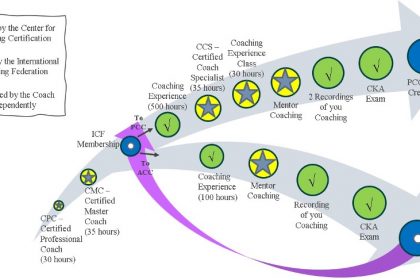
The International Coaching Federation, ICF, publishes Core Competencies for a coach. The Center for Coaching Certification programs are designed to develop and enhance these skills.
The Core Competencies, skills, to effectively coach are:
A. Foundation
1. Demonstrates Ethical Practice
2. Embodies a Coaching Mindset
B. Co-creating the Relationship
3. Establishes and Maintains Agreements
4. Cultivates Trust and Safety
5. Maintains Presence
C. Communicating Effectively
6. Listens Actively
7. Evokes Awareness
D. Cultivating Learning and Growth
8. Facilitates Client Growth
As the foundation for being a coach, embodying the coaching Code of Ethics and a coaching mindset are essential. Setting and maintaining agreements ensures clarity of responsibilities and how the engagement is managed.
An effective Coach establishes trust, co-creates the coaching relationship, listens well, understands how to work effectively with different personalities, utilizes the power of language, asks questions, and adheres to a strict Code of Ethics and Core Values.
Coaching itself is a core skill for leaders. Additionally, people skills and communication skills are the number one deficiency in the workplace today. Coach training teaches and enhances these skills, offering you the opportunity to exceed expectations in your career field. Diverse professionals enhance their skills, from sales professionals to attorneys and CEOs, from health care professionals to small business owners and NPO employees, from professional trainers or speakers to HR professionals. In short, anyone working in any industry, interacting with clients or employees, benefits from the skills developed in coach training.
The Center for Coaching Certification masterfully covers each of these topics in our training program, empowering you both to learn during classes and to apply this knowledge in trainer-supervised coaching sessions during your coaching practicum experience. Participants tell us they begin using the techniques immediately and feel prepared to start coaching after finishing the first program.
Becoming a professional coach is a journey. It starts with the initial training and continues with both starting to coach and continuing with training to earn a credential. Earning your coaching credential offers three key benefits: credibility amongst your clients and potential clients, coaching tools and support, and professional development.
As with any profession, training makes sense. Ensure you have the skills and tools to step up as a certified, professionally trained coach who supports results for your clients!



